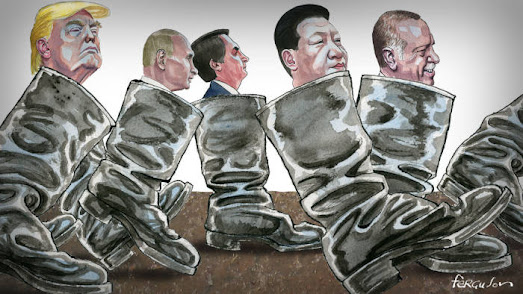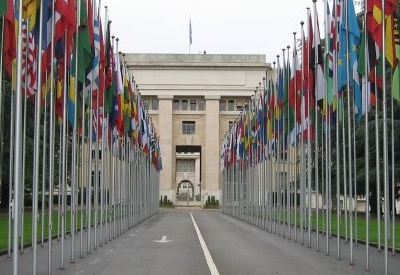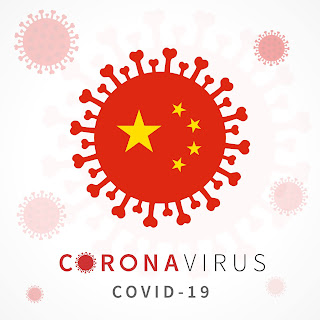Are Democracy's halcyon days over?
The presence of COVID has strained governments financially, and left a cleavage for authoritarian regimes to flex their muscles and reinforce their worth among their electorate. Some like former U.S. President Donald Trump appeal to the anti- vaxxers and right wing elements of government and voters. Others like Chinese President Xi Jinping see opportunities to spread the strength of its authoritarian style and wealth to appease developing countries and maintain trade levels internationally during the pandemic. Still, others like Canada and other western governments are embarking on FONOPS in the South China Sea to oppose China's central governments belligerence and threat to democracy. The threat to Taiwan and the rules - based international order has pushed the support for democracy further up the to -do list of democratic governments foreign policy objectives and questioning their all encompassing support for China through trade. Now, it is becoming clearer, that, with the cultural genocide of the Uyghur's in Xinjiang and the long suffering campaign against Tibetans and Tibetan culture, that China is well on its way to controlling resources in the South China Sea for economic reasons as well as for political reasons such as the Line of Actual Control separating Tibet(China) from India. The shift towards mainlandisation of Hong Kong has many Taiwanese wary of China's onslaught of fighter jets into their ADIZ (Air Defense Identification Zone) and the promise of a "one country/ two systems" policy that the central government reneged on, with the implementation of the national security law in Hong Kong in June 2020. Taiwanese authorities trust the U.S. and its Allies to help defend the island from a Chinese attack that will threaten their sovereignty and while democracy crumbles on the island. Indeed, Australia has commissioned the U.S. to build two nuclear submarines to defend its territorial waters. To counter Chinese aggression, the U.K., U.S. and Australia have formed an alliance: AUKUS a security agreement to counter Beijing's ever expanding PLAN navy. Recently, Japan and Australia have signed a security pact, as well for defense purposes to counter a rising China in the region. President Biden has procured The Summit for Democracy that prioritized national voting rights legislation to provide a fair path to the vote. Trump acolytes are trying to replace election officials with those sympathetic to the former President and manipulate voting rules in advance of the 2024 election. The U.S, Canada, European Union, India and Iraq among 111 participants agreed to focus the next year on advancing the right to vote, free and fair elections, a free press, and an independent judiciary stated by Canadian Prime Minister Trudeau. The group will return to meet in one year to discuss their objectives and findings. In the case, if attendee - Taiwan, ·it is not a UN member state and as a UN member, membership will strengthen Taiwan's democracy as can NATO if it welcomes Ukraine as a member - state. Both issues are at the fore; however, the U.S. and allies watched as China militarised the Spratley Islands in the South China Sea to support their nine - dash claim to those waters. With an emboldened China, the threat to democracy is international, particularly, with Chinese agents surveilling for those whose views oppose the central government. "...the notion of a collective security based system of governance that is restricted to five permanent members with veto power, that has existed since it's inception in 1945, seems disingenuous by today's growth in the developing world and circumstances since the end of the Cold War in 1991."1
The Strait of Malacca provides quick access as shipping lanes and can subvert access through the South China Sea. This area is controlled by Malaysia, Indonesia, and Singapore muting China's influence, though, the SCS is the fastest route for vessels moving goods. India can block this path with vessels, but, as HL Sutton from Forbes reports, China is building a new port in Pakistan to get around this potential debacle. "As part of the ‘Belt and Road Initiative’ they are building a new port in Pakistan. And the opening of the Northern Sea Route in the Arctic could create a ‘Polar Silk Road.’ Both offer ways around the Malacca vulnerability." It is a case of China chasing the authoritarian currency and influence in the region, while posing a threat to Canada's Arctic as the ice cap melts. Canadian authorities need to expand their military's role in protecting this area from Russia and China who are intent on bullying their way across the globe for economic gain. The focal point of defense policy for the U.S,. China snd Russia is to create hypersonic missiles that can evade detection by opposing missiles. Meanwhile, Japan and Australia have signed the RAA (Reciprocal Access Agreement) to enable their researchers, scientists and programmers the ability to collaborate on defense related issues. As reported by Reuters on Janary 7, 2022, Japan is developing an electromagnetic technology to target hypersonic missiles. "Si Vi Pacem, para bellum." "If you want peace, prepare for war."
NGO's help sustain democracy and human rights internationally
Facts and Figures
1. There are an estimated 10 million (non-governmental organizations) NGOs worldwide.
Source: The Global Journal
2. The number of people worldwide donating money to NGOs increased from 1.2 billion in 2011 to 1.4 billion in 2014. By 2030, the number is expected to grow to 2.5 billion.
Source: Charities Aid Foundation
3. The term “non-governmental organization” was created in Article 71 of the Charter of the newly formed United Nations in 1945. An NGO can be any kind of organization provided that it is independent from government influence and is not-for-profit.
Source: GrantSpace
4. Three out of four employees in the NGO sector are female, but the majority of leadership positions at NGOs are still predominately held by men.
Source: HR Council
5. There are more than 600,000 non-governmental organizations (NGOs) in Australia whose employees make up 8% of Australian workforce. However, only 60,000 of these NGOs are registered with the ACNC.
Source: Australian Charities and Not-for-profits Commission
6. With over 3.3 million non-governmental organisations, India has approximately one NGO for every 400 people.
Source: Infochange
7. The NGO sector in Kenya represents more than 290,000 full-time employees and volunteers of which 80% are under the age of 24.
Source: Devex
8. There are more than 129,000 public-benefit foundations in Europe. Combined these non-governmental organisations (NGOs) give more than 53 billion euros annually.
Source: Donors and Foundations Networks in Europe
9. Eighty-four percent of Canadians donate to non-governmental organizations with an average individual donation of $446 per year. In total, that is $10.6 billion donated to NGOs by Canadians every year.
Source: Imagine Canada
10. One out of every ten people in the United States works for a non-governmental organization (NGO). Thus, the NGO workforce is the third largest among U.S. industries, behind only retail trade and manufacturing.
Source: World Bank
11. The estimated value of volunteer is $23.07 per hour. Thus, the value of the 7.7 billion hours of volunteer work performed by 62.6 million Americans, or 25.4 percent of the adult population, in 2013 was $173 billion.
Source: Independent Sector
12. Eighty percent of global citizens agree that nongovernmental organizations (NGOs) make it easy to be involved in positive social change.
Source: Walden University
13. If NGOs were a country, they would have the 5th largest economy in the world.
Source: John Hopkins University
14. There are more than 1.5 million NGOs in the United States that combined contribute 5.3% to the Gross Domestic Product (GDP).
Source: National Center for Charitable Statistics
2 Global Leadership Bulletin. "Facts and Stats About NGO's Worldwide." 6 October 2015. 9 January 2022. <https://www.standardizations.org/bulletin/?p=841>.
Greatest risks to democracy in 2022
1) income inequality "The richest 10% of the global population currently takes 52% of global income, whereas the poorest half of the population earns 8.5% of it. On average, an individual from the top 10% of the global income distribution earns €87,200 (USD122,100) per year, whereas an individual from the poorest half of the global income distribution makes €2,800 (USD3,920) per year." World Inequality Lab 2022. <https://wir2022.wid.world/wwwsite/uploads/2022/01/Summary_WorldInequalityReport2022_Englishpdf>.
2) invasion by Russia into Ukraine
In the event of Russian aggression and encasement of Ukraine, a wide array of economic sanctions are being flouted by the EU, US, UK, NATO and Italy, Germany, Poland, and France. The Biden Administration has at least 8500 service individuals ready for movement, though, it seems in a non - combat support role. U.S. General Mark Milley deems diplomacy is needed to avoid countless casualties on both sides. The Russian economy is roughly the size of New York state. Sanctions have weakened it further (from the annexation of Crimea.) The new pipelined promises to exploit Russian oil and gas to customers in the E.U. E.U. members need to minimise trade with Russia to force them to adopt the international rules-based system. Te same dilemma exists with China. Reducing trade to get Beijing to mollify its authoritarian ways and play within the system of democracy. Currently, both Putin and Xi have met prior to the opening of the Olympics and are forging closer ties while denouncing NATO. Xi is fearful of a NATO expansion into the Indo Pacific and with an ineffective UN regarding collective security and unable to change with the times, an expanded NATO is an antidote to global authoritarianism.
3) invasion of Taiwan by China
Professor Jin Canrong - Renmin University, says the PLA can mount a successful invasion of Taiwan by 2027 (the 100 year anniversary of the PLA,) but could now manage that feat in one week. Jin, a China hawk, says the PLAN can limit the U.S. fleet to within 1,000 nautical miles of the shore-line. Taiwan has growing international support for its democracy with Japan, Lithuania, and others supporting their democratic way of life. Australia, and perhaps India might be looked to in times of need despite trade fallout with Beijing. A distracted U.S. in 2022 does not appear to be on Beijing's agenda to push into Taipei.
4) civil unrest in the U.S by forces loyal to Donald Trump
Donald Trump's political war chest is growing larger for the next mandate. Why the U.S. government will not fund a third party to promote democracy in the U.S. is questionable. A 3rd party will push both Republicans and Democrats toward the center where democratic values flourish. Trump PAC"S (Political Action Committees) are reported to have generated 51 million in the last half of 2021. He is not going to go away.
5) a fourth wave of COVID that debilitates economies and pushes people out of the mainstream employment spectrum >
a) a revamping of the workplace that restricts worker rights >
b)what is the COVID industry replacing; is it adding to technology, Green Economy, health care answers in other areas > is the health care economy reinforcing the Green economy and crowding out fossil fuels and environmental threats
c)more demand for rare earths that Canada and the U.S. can develop to further decouple from China and create economic opportunities at home. - Further straining China - Canada/ U.S. relations
6) the inability of nation - states to keep attention on climate objectives due to the pandemic
Major G 20 nation states have promised 350 USD billion toward fossil fuels. Subsidies are killing the move towards a Green economy vis a vis governments missing an opportunity to link the COVID recovery with achievable climate goals. Fossil fuel subsidies encourage wasteful consumption. One writer suggests taxing gasoline and diesel at 12.5 cents per litre and coal at 5 USD per tonne and removing subsidies. 3
7)a mishap between China and U.S. in the South China Sea/ Indo Pacific
The U.S. FONOPS create more opportunities for military exchanges that can lead to accidents. Taiwanese President Tsai ing-wen has warned China against "military adventurism."
1Kieswetter, Kevin. "Laissez-faire to realpolitik: collective security in a challenging period." 24 March 2019. 9 January 2022. <https://kevinkieswetter.blogspot.com/2019/03/l-aissez-faire-to-realpolitik.html>.
2Global Leadership Bulletin. "Facts and Stats About NGO's Worldwide." 6 October 2015. 9 January 2022. <https://www.standardizations.org/bulletin/?p=841>.
3 Sanchez, Lourdes. "Five Missed Opportunities to Support the Energy Transition in COVID-19 Recovery." 14 October 2021. 1 February 2022. <https://sdg.iisd.org/commentary/guest-articles/five-missed-opportunities-to-support-the-energy-transition-in-covid-19-recovery/>.





